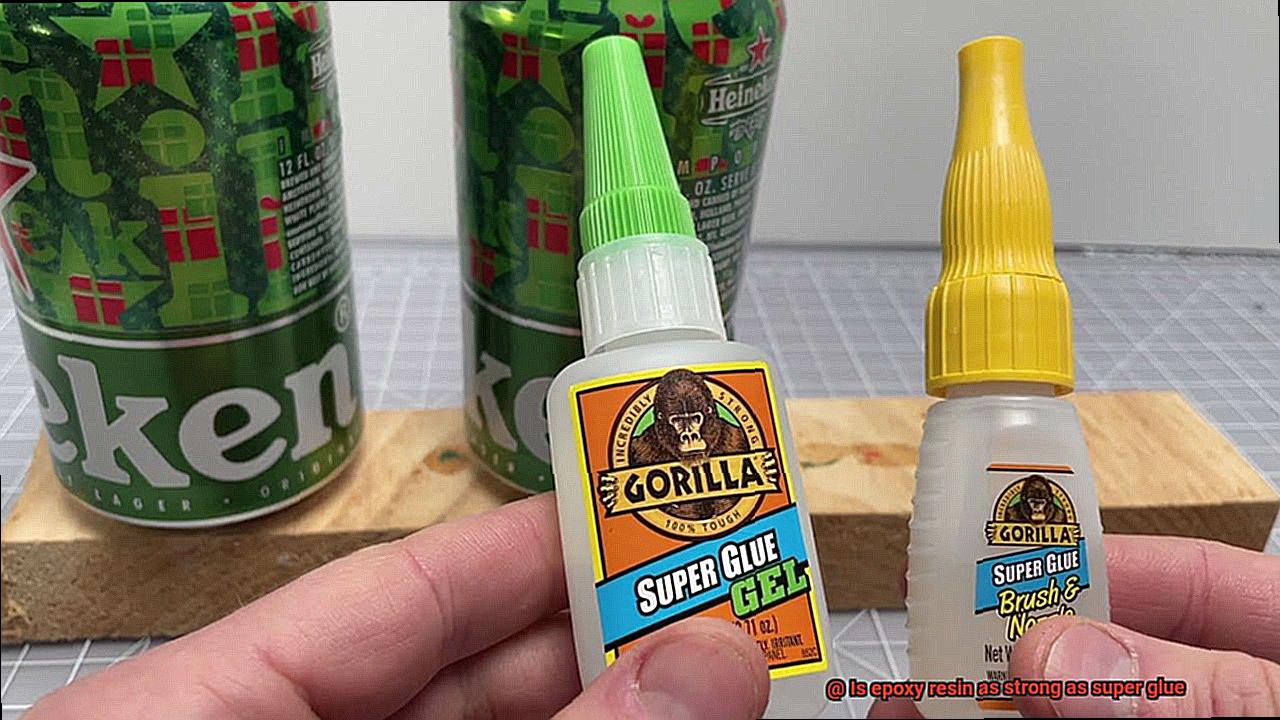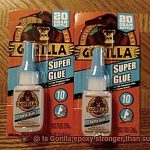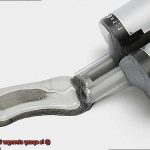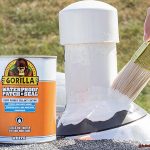Are you tired of adhesives that don’t quite live up to their promises? Do you need an adhesive that can handle heavy-duty projects and withstand exposure to water, heat, and chemicals? Look no further than epoxy resin and super glue.
Super glue is a cyanoacrylate adhesive known for its fast-drying and super-strong bond. It’s perfect for smaller projects with a quick turnaround time. However, it may not hold up well under heavy stress or continuous exposure to moisture.
Epoxy resin, on the other hand, is a two-part adhesive that creates a chemical reaction to bond materials together. It’s incredibly strong and durable, making it ideal for large-scale projects like boat building, car repairs, or even jewelry making.
So, is epoxy resin as strong as super glue? The answer isn’t so simple. While both are trusted adhesives with different strengths and weaknesses, it ultimately depends on your project’s requirements. If you need a quick and reliable bond for a small project, super glue is the way to go. But if you need something more robust for larger projects with demanding conditions, epoxy resin is undoubtedly the superior option.
In this post, we’ll explore the characteristics of both adhesives in-depth and compare their relative strengths. By the end of this article, you’ll have all the information you need to decide which adhesive will work best for your next project.
Properties of Epoxy Resin
Contents
Epoxy resin is a remarkable adhesive that has been relied upon across numerous industries for many years. The properties of this thermosetting polymer make it an ideal choice for bonding materials in structural and industrial settings.
Let’s explore the unique properties of epoxy resin that make it such a popular and effective adhesive.
Strength and Durability
One of the most notable properties of epoxy resin is its exceptional strength and durability. Once the resin is mixed with the hardener and cured, it forms a hard, rigid bond that can withstand high levels of stress and strain without cracking or breaking.
This property makes it an ideal choice for structural applications, such as in the construction industry, where materials need to stay firmly bonded under heavy loads.
Chemical Resistance
Epoxy resin also boasts excellent chemical resistance. It is impervious to water, acids, and other chemicals, making it highly suitable for use in harsh environments. This property makes it an ideal choice for bonding materials in chemical processing plants and other industrial settings where harsh chemicals are used regularly.
Dimensional Stability
Another important property of epoxy resin is its good dimensional stability. Once cured, it does not shrink or expand, ensuring a tight and secure bond between the materials. This property makes it an ideal choice for bonding materials with different coefficients of thermal expansion, making sure that the materials stay firmly bonded even when exposed to heat or cold.
Long Shelf Life
Finally, epoxy resin has a long shelf life. The two-part system can be stored separately for an extended period without losing its adhesive properties. This property makes it convenient for use in applications where the adhesive needs to be stored for later use. This means that you can keep the epoxy resin on hand until you need it without worrying about losing its adhesive strength.
Properties of Super Glue
Look no further than super glue, also known as cyanoacrylate adhesive. As an expert on the properties of this incredible adhesive, I can assure you that it is one of the best options out there.
One of the most impressive properties of super glue is its fast-drying capability. Unlike other adhesives that require hours to set, super glue bonds almost instantly with surfaces such as metal, plastic, rubber, and wood. Plus, the bond created by super glue is permanent and incredibly durable. Whether you’re fixing a broken toy or repairing a piece of furniture, super glue will get the job done right.
Another great feature of super glue is its ability to work on a variety of surfaces. Its chemical composition allows it to bond almost instantly with a wide range of materials. Additionally, this adhesive is waterproof and heat-resistant, making it versatile for different applications such as automotive repairs or household fixes.
Super glue comes in different viscosities which gives it more flexibility. Thin viscosity super glue is perfect for small parts or precise applications while thicker viscosity super glue can fill gaps in larger surfaces. This makes it an ideal choice for both small and large projects.
However, it’s important to note that super glue does have some limitations. Certain materials such as glass or ceramics may require specialized adhesives instead. Additionally, if the bond will be subjected to continuous stress or movement, then super glue may not be the best option.
Advantages of Using Epoxy Resin
As an expert on the advantages of using epoxy resin, I’m here to tell you why this versatile adhesive should be your go-to for all your heavy-duty bonding needs.
First and foremost, let’s talk about strength. Epoxy resin can form a bond that is stronger than the materials it is bonding together. This makes it ideal for use in heavy-duty applications, like repairing a cracked engine block or reinforcing a wooden table leg. With epoxy resin, you can trust that your project will have the strength it needs to withstand even the most demanding conditions.
But strength is just the beginning. Epoxy resin also boasts impressive durability. It can withstand extreme temperatures, moisture, and chemicals without losing its adhesive properties or breaking down over time. So whether you’re working on an outdoor project subject to harsh elements or a chemical-heavy industrial application, epoxy resin has got you covered. With its durability, you can have peace of mind knowing your project will stand the test of time.
Versatility is another advantage of using epoxy resin. It can bond a variety of materials including metal, wood, plastic, and even glass. And if you need to fill gaps or cracks, or protect surfaces from wear and tear, epoxy resin can do that too. This makes it an ideal choice for a wide range of applications, from DIY projects to industrial settings.
But what sets epoxy resin apart from other adhesives is its customizability. By adding different additives, epoxy resins can be formulated to meet specific application requirements. Need increased flexibility? No problem. Resistance to UV light? Sure thing. Improved thermal conductivity? You got it. With epoxy resin, you can tailor your adhesive to best suit your project’s needs.
Advantages of Using Super Glue
If you’re looking for a reliable adhesive that can handle almost any project, super glue is the answer. Also known as cyanoacrylate adhesive, this versatile adhesive offers several advantages that make it stand out from other types of adhesives.
One of the most significant advantages of super glue is its strength. Unlike other adhesives that may struggle to bond heavy objects together, super glue creates an incredibly strong bond. This makes it ideal for materials such as metal or wood that require extra support. Additionally, super glue’s waterproof properties make it perfect for use in wet environments where other adhesives may fail.
Another advantage of super glue is its quick drying time. While other adhesives can take hours or even days to dry, super glue bonds almost instantly. This makes it an excellent choice for quick repairs or situations where time is of the essence.
Super glue is also incredibly versatile and can be used on a wide range of materials such as plastic, rubber, and wood. Whether you’re working on a DIY project or an industrial application, super glue is a go-to adhesive that can handle almost anything.
Lastly, using super glue is a breeze. Simply apply a small amount of glue to one surface and press the two surfaces together. The glue will bond quickly and securely, providing you with a durable and long-lasting bond.
Disadvantages of Using Epoxy Resin
Epoxy resin may be a popular choice, but before you dive in, consider the potential disadvantages that come with using this powerful adhesive.
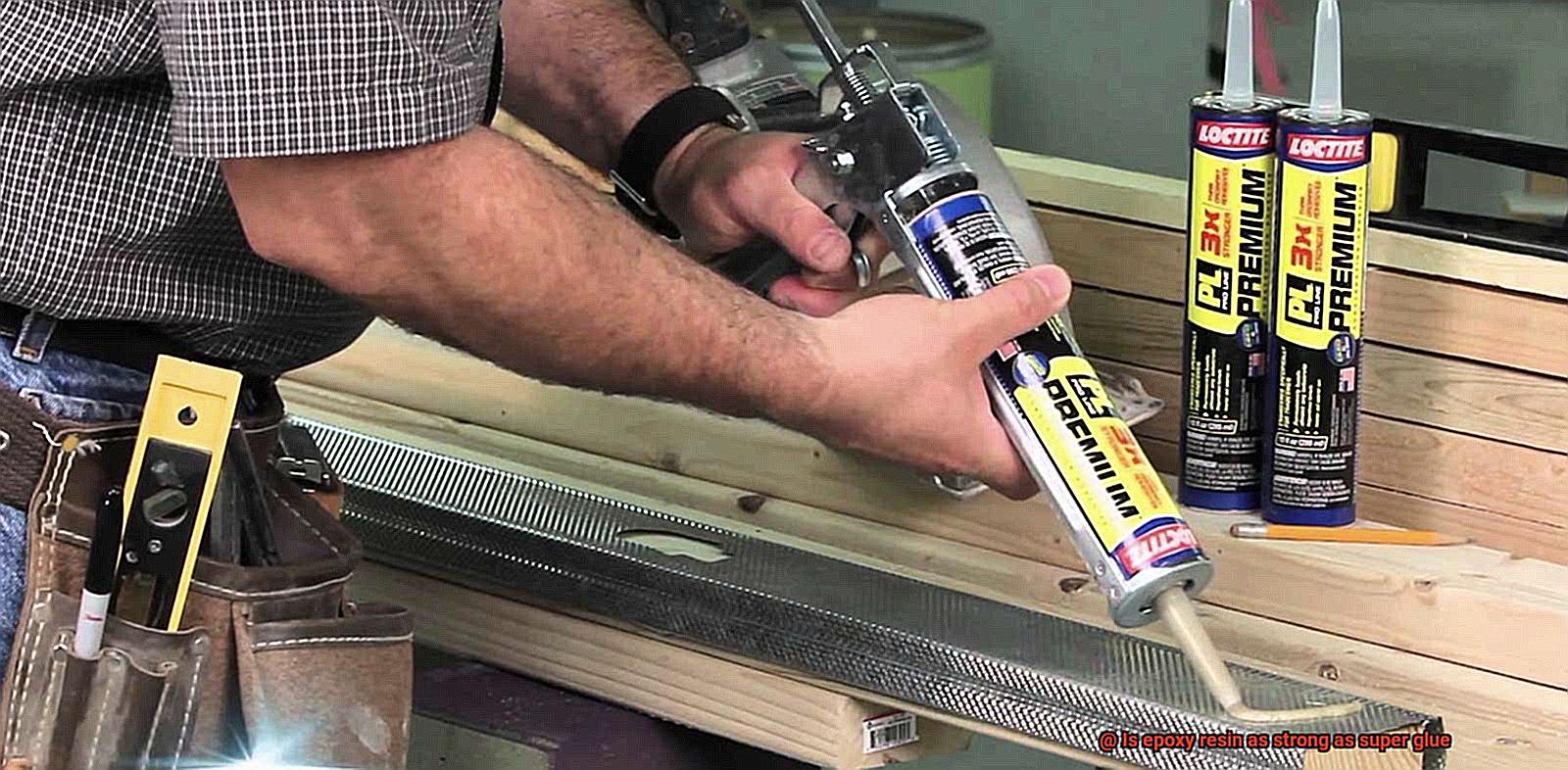
One major drawback of epoxy resin is its toxicity. Fumes released during the curing process can be harmful if inhaled over a long period of time, causing respiratory irritation or even damage to the central nervous system. To avoid these risks, be sure to use epoxy resin in a well-ventilated area and protect yourself with gloves and a respirator.
Another downside to keep in mind is epoxy resin’s sensitivity to temperature and humidity. The curing process requires specific temperature conditions, and high humidity can cause bubbles on the surface of the resin, making it tricky to work with. Be mindful of these requirements before beginning your project.
Epoxy resin also has a relatively short shelf life compared to other adhesives. Once opened, it must be used within a certain amount of time before becoming unusable. This can be frustrating if you only need small amounts of epoxy resin sporadically.
And lastly, once epoxy resin has cured, removing excess from surfaces it wasn’t meant to bond together can be difficult. Take precautions when applying the resin and avoid any accidental drips on unwanted surfaces.
Disadvantages of Using Super Glue
While super glue may seem like the perfect solution, it’s essential to weigh its disadvantages before making a decision. As an expert on this topic, I’ve compiled some research notes that highlight the drawbacks of using super glue.
Firstly, one significant disadvantage of super glue is its brittleness. Unlike epoxy resin, it’s not flexible and can easily crack or break under pressure. This makes it unsuitable for projects that require durability and flexibility. So, if you’re looking for an adhesive that can withstand wear and tear, super glue may not be the best option.
Another drawback of super glue is its inability to bond well with certain materials such as glass or metal. The bond may not be strong enough, and the glue may fail after a short period. Additionally, super glue cannot fill gaps between surfaces since it’s a thin liquid that hardens quickly and can’t be sanded or painted over once it dries. This limitation makes it unsuitable for projects that require precision and a seamless finish.
Furthermore, super glue is not waterproof, which means that exposure to water or moisture can weaken the bond and eventually lead to breakage. In contrast, epoxy resin can withstand water exposure without losing its strength. So, if you need an adhesive for outdoor or water-based projects, super glue might not be suitable.
When it comes to safety, super glue contains chemicals that can irritate the skin and eyes. Inhaling the fumes can also cause respiratory problems. Therefore, it’s crucial to use super glue in a well-ventilated area and avoid contact with bare skin.
Lastly, super glue has a limited shelf life once the tube is opened. It can dry out quickly, making it unusable. Proper storage in a cool and dry place can help extend its shelf life, but it still needs to be replaced every few months to ensure effectiveness. So, if you’re looking for an adhesive with a longer shelf life, epoxy resin might be a better option.
Applications for Each Adhesive
Epoxy resin and super glue are two of the most popular options, but they have different properties that make them better suited for certain tasks.
Epoxy resin is like the Hulk of adhesives – strong and durable. Its two-part composition of resin and hardener, once mixed together, forms an unbreakable bond that can withstand heavy loads, vibrations, and extreme temperatures. This makes it ideal for construction, automotive repair, and marine applications. It’s perfect for bonding metal parts together that need to endure high stress conditions.
On the other hand, super glue is like Spiderman – quick and efficient. It dries quickly and forms a strong bond in seconds. This single-component adhesive is great for bonding small objects such as jewelry or electronics components. However, it may not hold up well under heavy stress or extreme conditions. It’s the go-to adhesive for quick fixes on small objects.
When choosing between epoxy resin and super glue, it’s important to consider the specific application. If you need to bond two metal parts together that will be exposed to high temperatures or vibrations, epoxy resin would be the better choice. Its strength and durability will ensure a long-lasting bond that won’t break under pressure. But if you’re repairing a small plastic part or attaching a piece of jewelry, super glue may be sufficient.
Overall, both epoxy resin and super glue have their own unique strengths and applications. Epoxy resin is perfect for heavy-duty jobs where strength and durability are paramount. Super glue is ideal for quick fixes on small objects. By understanding their properties, you can select the best adhesive for your specific needs.
Comparing the Strengths and Weaknesses
Fear not. As a seasoned expert in comparing the strengths and weaknesses of these two adhesives, I’m here to help.
First, let’s delve into their strengths. Epoxy resin is a powerhouse – known for its exceptional strength and durability, it can bond to various surfaces, including metals, plastics, and wood. Its resistance to heat and chemicals makes it an ideal option for industrial applications. On the other hand, super glue is like a superhero – quick and efficient for small fixes. It sets in seconds and creates a robust bond that can hold up to moderate stress.
Now, let’s talk about their weaknesses. Epoxy resin’s curing time can be a drawback; it may take several hours to cure entirely, which could inconvenience you if you need to use the bonded item immediately. Additionally, it can be messy to work with and may require special equipment or protective gear. Super glue may not be suitable for heavy-duty jobs as it may not hold up well under intense stress or weight. It can also dry out quickly if not stored correctly and can be challenging to remove if accidentally applied to unwanted areas.
In summary, both epoxy resin and super glue have their pros and cons. To make the right choice, consider the specific project or repair you need to complete. If you’re working on a heavy-duty job that requires exceptional strength and durability, epoxy resin is your best bet. However, if you need a quick fix for a small repair, super glue is a more efficient option.
DpDKTqnesMI” >
Conclusion
In conclusion, the choice between epoxy resin and super glue depends on the task at hand. Each adhesive has its own unique characteristics that make it suitable for different applications. Epoxy resin is a powerhouse adhesive renowned for its exceptional strength, durability, and chemical resistance. It’s perfect for heavy-duty jobs that require a long-lasting bond capable of withstanding high-stress conditions. Super glue, on the other hand, dries quickly and creates a robust bond that works well for small fixes.
When deciding which adhesive to use, it’s crucial to consider the specific project or repair you need to complete. If you’re working on an industrial application or repairing a large object that requires exceptional strength and durability, epoxy resin is your go-to choice. But if you need a fast fix for attaching jewelry pieces together or completing a small repair job, super glue is more efficient.
No matter which adhesive you choose, safety should always be your top priority. Always work in a well-ventilated area and wear protective gear such as gloves and respirators to avoid inhaling fumes or coming into contact with bare skin.
By understanding the properties of both adhesives and comparing their strengths and weaknesses, you can select the best adhesive for your specific needs.

